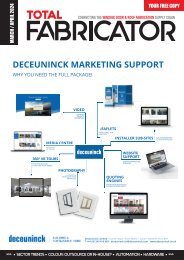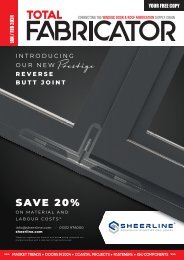Create successful ePaper yourself
Turn your PDF publications into a flip-book with our unique Google optimized e-Paper software.
“At a macro level it can no longer be acceptable
or practical for risk to be cascaded down the
chain, it must be shared; be it insurance risk,
liquidity risk, credit risk or reputation”
issues contribute to us facing a “Perfect Storm”,
and we are racing towards it, full throttle.
The firms who will survive this maelstrom must
first, and above all else, place real value on their
teams and their people. It is impossible to over
communicate in the current climate, particularly
with large swathes of the workforce being remote.
Whilst many sites are working, process
challenges, which were once easy to deal with
prior to the physical issues and remote working,
abound. Yes, existing tech is helpful to a point,
but construction is so far away from being a techdriven
industry. Organisations must prioritise
technological advancement throughout the supply
chain and, in order to achieve it, have the
available margin to make that significant
investment. Firms must show significant
resilience and prioritise our purpose, and
communicate that clearly to employees first, but
also clearly to clients and end users, and they
must have the relevant collateral to do so.
“The sector cannot
continue with a simple
‘win the job, do the
work, get paid, on to the
next’ attitude, hence
behaviour will be king”
At a macro level it can no longer be acceptable or
practical for risk to be cascaded down the chain,
it must be shared; be it insurance risk, liquidity
risk, credit risk or reputation. To survive, the
industry must work together and all risks must be
shared appropriately and proportionally through
the chain, with the client fully aware and bought
in. We must be fully invested in desired client
outcomes and the sector cannot continue with a
simple “win the job, do the work, get paid, on to
the next” attitude, hence behaviour will be king.
That behaviour should represent what your brand
stands for – to proudly carry like an Olympic
torch – to be there to assist and to actively
collaborate.
“The procurement
process must be based
around demonstrable
capability,
accreditation, safe
methods of working to
specific quality
standards”
Service over cost
Since there will undoubtedly be less money in the
chain, there is a huge risk of “value engineering”
requests, some of the results of which we have
tragically seen. Public body procurement must
lead the way here, where service is prioritised
over cost, and the whole supply chain is engaged
at the beginning. Frameworks where “cheapest
wins” are going to see contractors fail faster and
in a more widespread fashion when firms buy
work then cannot meet the liquidity requirements
and the resultant effect this has on the rest of the
chain. Value must be placed on specialist subcontractors,
not JCT contracts with dozens of
one-sided amendments.
We can, though, look at “whole life value” on
projects rather than the headline tender price, but
to do so, the supply chain must be engaged with
each other right at the very start for all to benefit
from one another’s expertise. Let’s be absolutely
clear, if a firm “wins” a tender with a price 10%
lower than everyone else’s, that should set off
alarm bells, and not be something to be
Complete Roofing Systems recently carried out works on
Stockport Grammar School installing a Bauder flex felt
system including an AP2 cap sheet and XF301 sedum
blanket.
celebrated as a saving on the job, since it is likely
to translate to a financial problem or other risk
item down the line. The procurement process
must be based around demonstrable capability,
accreditation, safe methods of working to specific
quality standards and the guarantee of following
manufacturer installation instructions where
systems work together rather than in isolation.
For a firm to survive going forward, it must
decline requests to amend a spec to save money
without empirical evidence that a whole system
can work with a cheaper element and, crucially,
with the components of the build which have
already been designed and meet relevant
standards. The sector as a whole must move
away from a transactional model and be far more
service based.
What is required to drive this change for the
benefit of all? Clear and pragmatic leadership
across all levels of the supply chain. Not just lip
service, which makes a flashy headline and an
increase in Twitter followers, but clear intent from
leaders at all points in the chain – we all have a
part to play. We will never have a better and more
urgent opportunity to do this.
Contact Complete Roofing Systems
01925 813554
www.completeroofingsystems.co.uk
JUNE 2020 TC 23

















